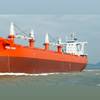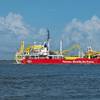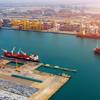ABS Harsh Environment Technology Center Releases Study
The first comprehensive research study released from the ABS Harsh Environment Technology Center (HETC), based at Memorial University of Newfoundland (MUN), examines the challenges and management of water produced in association with energy operations in Arctic environments. Produced water represents the largest volume of waste from oil and gas operations and is associated with significant management costs.
Professor Kelly Hawboldt of MUN and her research team explore the effects of produced water on the Arctic environment where cold temperatures, fragile ecosystems and unmanned operations pose unique challenges.
The study titled “Review of Produced Water Management and Challenges in Harsh/Arctic Environments” examines produced water characteristics, environmental impacts, current policy and regulations as well as management techniques currently in use for produced water throughout the world. The paper highlights emerging technologies and suggests areas for further review.
Although there have been few studies on produced water discharged in the Arctic, the MUN staff has extensive experience with certain aspects of produced water, including modeling and treatment. “We are pleased to have sponsored the efforts of MUN faculty who have undertaken this study,” says Roger Basu, ABS Director, Shared Technology and head of the class society’s Harsh Environment program.
Basu sai another study currently underway at the center focuses on offshore drilling in harsh environments with the long-term goal of developing guidance from ABS. “We envision technical guidance in the form of a primer for offshore drilling in harsh environments. We expect it to take into account such concerns as logistics and exploration, well control, Arctic transportation systems and environmental challenges, including awareness for the regulatory framework,” he explained.
In addition, the ABS HETC will be working with industry to address the need for guidance regarding escape, evacuation and rescue (EER) systems on board vessels and offshore units operating in extreme cold weather climates. It is anticipated that guidance will be created that can serve as the basis for the development of an operators’ safety and emergency response plans for offshore installations. It would include directions for identifying credible hazards and instituting an emergency response plan; the need for hazard scenario planning; establishment of clear command and communication structure before an emergency; escape and muster processes; and the use of personal survival equipment, evacuation measures in adverse conditions and rescue resources.
The ABS HETC at MUN was created in 2009 to support the development of technologies for ships and offshore structures operating in harsh environments. It is an extension of ABS’ robust polar and harsh environment program located within the ABS Technology department.
Memorial is Atlantic Canada’s largest university and ABS has a long-standing relationship with the academic institution having worked together on various research and development projects.
www.eagle.org












